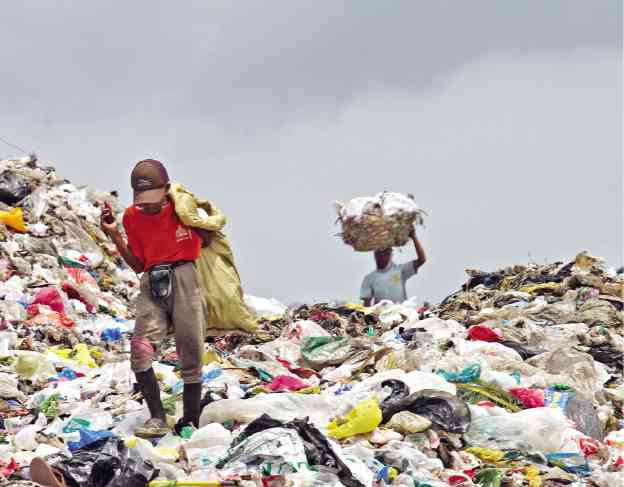
The Inayawan landfill is a source of income for scavengers in Cebu City. —JUNJIE MENDOZA/CEBU DAILY NEWS
(First of three parts)
CEBU CITY—It may be highly urbanized and the most progressive place outside Metro Manila, but this city of over 700,000 people does not know where to dump the 600 tons of garbage it produces daily.
A city-owned landfill in Barangay Inayawan was spilling beyond capacity after 19 years, so the Court of Appeals, in a landmark decision, closed down the 15-hectare facility permanently in December last year.
Earlier, then Mayor Michael Rama had shut down the landfill in January 2015 and brought the garbage to a private dump in the northern town of Consolacion, paying P700 per ton as tipping fee.
His archrival and successor, then acting Mayor Margarita Osmeña, reopened the Inayawan facility in July 2016. When Osmeña’s husband, Tomas, took over the mayoral post on July 1, 2016, he continued its operations, allowing the city to save P350,000 a day in tipping fees.
Built in 1995, the Inayawan landfill began operating three years later and was viable only until 2005.
While it may have brought some savings, it befouled the environment and triggered complaints of sickness from people in nearby homes, schools and business establishments.
The Environmental Management Bureau (EMB), an agency of the Department of Environment and Natural Resources, found serious violations in the continued operations of the facility.
These included the city’s failure to secure a discharge permit to check if effluents were within standards, failure to provide cover for all garbage trucks to prevent litter from being blown away, lack of soil covering after waste spreading and compacting, lack of a leachate plant and landfill glass flaring system, and failure to conduct weekly monitoring of chemical and biological conditions.
Closure plan
As it could no longer be rehabilitated, the Department of Health (DOH) recommended its closure.
Osmeña, the incumbent mayor, refused to act on it, claiming that the city could not dump its waste again in the Consolacion landfill for lack of a valid contract with its operator, Asian Energy System Corp.
In September last year, opposition Councilor Joel Garganera sought a writ of kalikasan from the Court of Appeals to compel the city to close the landfill. The court subsequently ordered its permanent closure in December and ordered the city to facilitate its rehabilitation.
Without a dump, the city government designated a “temporary transfer station” in a one-hectare area of South Road Properties and contracted a private firm, Jomara Konstruckt Corp., to haul the garbage to the station at a cost of P1,375 per ton.
The hauling service was extended in January for P25 million after its one-month emergency contract expired in December.
In February, the city conducted a bidding for the garbage hauling deal worth P77.8 million. Jomara still bagged the deal because the amount already included transportation and tipping fees.
A consultant will be hired to formulate the closure plan in six months for the Inayawan landfill, according to Nida Cabrera, the city’s environmental consultant.
The project study, worth P2.5 million, was opened to bidders on April 11.
The winning bidder will also conduct tests on the levels of hazardous gases and other substances in the landfill, and suggest measures to avoid any disaster, as well as draw up drainage development and fencing plans.
“The closure plan will include the identification of a post-utilization plan for the landfill after its closure. They will recommend how the city should use the landfill now that it’s closed. But it is part of our plan to utilize a portion of the closed landfill for the operation of a new technology—a waste-to-energy (WTE) facility,” Cabrera said.
She said the city had already secured a grant from Asian Development Bank for the conduct of the WTE feasibility study. So far, she added, four study proposals had been received from different foreign firms.
In the meantime, residents of Cebu City are crossing their fingers that the WTE will not follow the fate of city ordinances on waste management—not implemented.